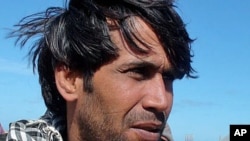The popular uprising in Libya, unlike others in the region, has turned into armed conflict. On the front lines, rebels dodge Libyan air strikes and fire back at Libyan military jets overhead. The rebels are a mixed group, but all share the desire to topple their country's longtime ruler. One of the front-line volunteers in rebel-held Ras Lanuf spoke about the situation.
Abdel Halim Barassi stands guard over the oil refinery. It is a key asset in this energy-rich country, and marks the edge of the rebel-held eastern areas that have thrown off control by Libyan leader Moammar Gadhafi.
Government forces are trying to drive the rebels from their position with rockets and air strikes. Barassi is among the ragtag militia attempting to keep them at bay with anti-aircraft guns and Kalashnikovs.
It is an uneven fight, but the young rebel vows to press on.
Barassi said he will go to Tripoli, the capital; he will not rest until he reaches his goal or dies trying.
His bravado is shared by the others in this dusty spot on the Tripoli-Benghazi highway - a narrow ribbon of a battlefield along the northern edge of Africa.
Like many of his age 20-something counterparts, Barassi was frustratingly unemployed before taking up arms in the anti-Gadhafi movement. With a kaffiyeh draped around the collar of his borrowed camouflage jacket, he, along with his comrades, appear every inch the classic revolutionary.
As those around him chant that "God is Great," he defines their mission: to free Libya from a despot.
Much the way Colonel Gadhafi justified the coup that brought him to power more than 40 years ago.
The irony of a popular uprising against a man who has long fashioned himself the ultimate rebel - flouting conventions, supporting revolutions near and far - is perhaps lost on this group of insurgents.
Most were born too recently to consider Gadhafi, 68, a "Brother-Leader" as he likes to call himself. They see, instead, an ossified leader, trying to foist his sons on Libya as if it were a kingdom.
Barassi struggles to find a fitting epithet for his enemy. He settles on terrorist, "a first class terrorist." He then heaps praise on Osama bin Laden as a man who is "100 percent."
It is not clear if Barassi is hurling a comparative insult, or if he has genuine admiration for the al-Qaida chief.
Such is the legacy of Colonel Gadhafi: that Libyans have lived so long in fear of speaking out that what they want remains to a large extent unknown.
So far, no cohesive message has come from the rebel fighters. Some take orders from a military council in Benghazi. Others simply come to the front. They share a desire to oust the man who, too, once promised a better future for Libya. But if they succeed, what they want next is anyone's guess.




